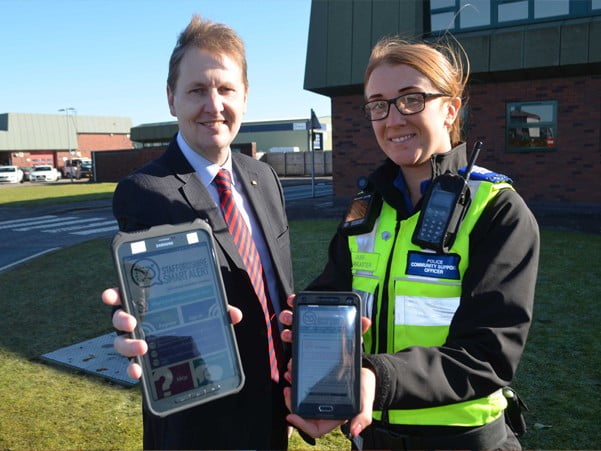People in Staffordshire want policing to be visible and there when they need it, new national research has found.
Ipsos MORI was commissioned by Her Majesty’s Inspectorate of Constabulary (HMIC) to carry out a national public survey of views and experiences of local police. A total of 26,458 people were questioned.
Staffordshire’s Police and Crime Commissioner Matthew Ellis was asked to speak on BBC Radio 5 live due to the positive work towards increasing the visibility of police in Staffordshire.
Mr Ellis talked about the ongoing importance of police visibility as the complexity of crime increases.
Speaking on BBC Radio 5 live, Mr Ellis said people were “very keen” to see more visible policing and the investment in technology – including the ongoing roll-out of mobile data devices for officers would help police spend more time in communities.
The roll-out of the first phase of apps for the devices has been completed, allowing officers to carry out more tasks in communities instead of returning to police buildings to enter information into computers. The second phase of apps is beginning with a further roll-out, allowing officers to do even more, planned in the near future.
Mr Ellis said: “I’ve arrived at a place where I believe we need to cut down on bureaucracy, which has been said many times before but is not easy to do. We need to get police being more visible, having a mobile office in effect with them walking around.
“In Staffordshire we’ve started that journey. I want to make sure officers have the right tools for the job. The top priority is to get officers out and about – more visible and more available. The new apps already on the mobile devices officers have speeds up work and means the days when officers had to enter the same information many times on different computer systems will be consigned to history.
“Early indications from the work towards increasing police visibility are encouraging. But the complexity of crime means an awful lot of it is done on the internet in the background, which means resources need to be targeted and balanced.”
With the mobile technology being used in Staffordshire, officers are able to perform far more activities away from police buildings through a range of apps which are tailored to their role. Each mobile device has access to key processes such as taking electronic witness statements, stop and search forms, missing people reports and crime scene management. It will also allow officers to share information – such as domestic abuse risk assessments – directly with other agencies at the touch of a button.
Mobile technology has now been rolled out to more than 2,000 frontline officers and PCSOs across Staffordshire and Stoke-on-Trent, with more applications to follow on the devices. Around 100 Special Constables are also being given the mobile technology, based on operational need, in communities across Staffordshire and Stoke-on-Trent.
The Ipsos MORI national survey into public confidence in policing can be found at: www.ipsos-mori.com/Assets/Docs/Publications/sri-public-views-of-policing-in-england-and-wales.pdf



